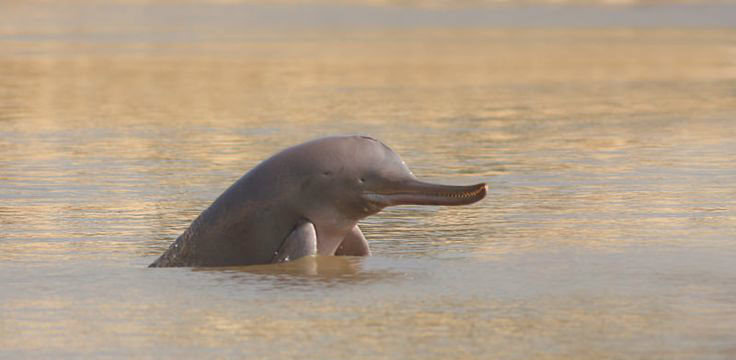SUKKUR – A blind dolphin has died of injuries shortly after it hit the gate of the Sukkur barrage, the wildlife department said on Tuesday.
The dolphin was swept away into the Khairpur Feeder West canal from the barrage during its annual cleaning and succumbed to its injuries due to old age.
Locals said they contacted the rescue department soon after the dolphin was spotted but the officials failed to reach on time.
Some 700 dolphins populate the waters between Guddu and Sukkur barrage, according to the country’s wildlife department.
A blind dolphin rescue centre has been established at the Sukkur barrage to ensure swift rescue in the event of such an incident.
The Indus river dolphin (Platanista gangetica minor) or Indus blind dolphin is an obligate freshwater cetacean and a global priority species of WWF-P.
It is endemic to the Indus River system in Pakistan and is listed as endangered in the International Union for the Conservation of Nature (IUCN) Red List of Threatened Species due to an 80% decline in its habitat range as a result of the construction of barrages along the river (which has divided the population into five sub-population) as well as from water pollution, stranding in irrigation canals and accidentally becoming caught in fishing nets.
https://en.dailypakistan.com.pk/pakistan/pakistans-endangered-blind-dolphin-numbers-on-the-rise-thanks-to-wwf/
A WWF study in December, however, said the number of the endangered fish, also known as bhulan, is on the rise – a significant positive development despite pollution threat.
In its report titled ‘Signs of Hope for the Endemic and Endangered Bhulan,’ the WWF Pakistan has noted that the species, almost at point of extinction a decade ago, increased in number from only 1,200 in 2001 to 1816 -1900 in 2017.
At least 1,816 dolphins were sighted in the long stretch of 808 kilometres of the main channel of the Indus River, concluded the study, conducted by a team of experts from the Zoological Survey Department of Pakistan, WWF Pakistan, academic researchers from various educational institutions and the wildlife departments of Sindh, Punjab and Khyber Pakhtunkhwa.














